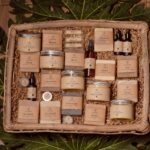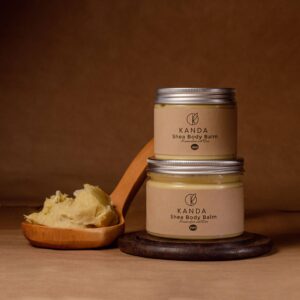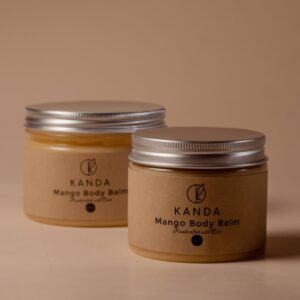
Top Natural Skincare Ingredients For Your Baby
July 22, 2024
Celebrating 2 Years of Success and Empowering Innovation in Nigerian Natural Skincare
August 5, 2024Eczema is a common skin condition where very itchy dry patches can form on different body parts. If you have eczema or think you may have developed it, please consult a dermatologist for a diagnosis and treatment plan. Often eczema patients scratch the itch to try and relieve the discomfort, but this can sometimes damage the skin barrier, making the symptoms even worse. For some people, it can be a never-ending cycle of scratching and damaging.
Unfortunately, while you may want to know how to get rid of eczema fast – there are no quick fixes but dealing with the symptoms of eczema, such as dry, itchy skin can help.
Causes of Eczema
While there are many external causes of eczema, for many of us it’s due to genetics. If you have a family history of eczema, you are more likely to suffer from it too. Although eczema isn’t an allergic reaction, it may be triggered by some common allergens. If you suffer from the condition, harsh soaps, perfumes, makeup, and laundry detergents can irritate and make the symptoms flare up. Other factors such as stress, excess sweating, and temperature changes may also cause the skin to dry out.

Symptoms Of Eczema On Dark Skin
Eczema can cause swelling, dryness, and skin discolouration. This skin discolouration will appear differently on different skin tones. For people with dark skin, eczema can cause darker brown, purple, or grey patches. The affected areas may be swollen, warm, itchy, dry, or scaly. After a flare-up, the affected skin may look darker (hyperpigmentation) or lighter (hypopigmentation) than the surrounding area.
How To Reduce Eczema Symptoms And Relieve Dry Itchy Skin
It may be difficult for some people to get rid of eczema completely, but it is possible to help ease some of the symptoms by relieving the dry skin associated with eczema and minimising itchiness. To effectively relieve the itchiness, you should:
- Regulate temperatures – Heat dries the skin out. Take shorter, cooler showers or baths to prevent the skin from losing excess moisture. Also, control the temperatures inside your home. Use an air conditioner to keep cool when the weather is hot and humid, and invest in a humidifier for when the weather is cold and you need to put the heating on.
- Wear loose clothing – Cotton fabrics are a good choice for people with eczema. Wool and some other man-made fibres can irritate the skin. You should also stick to wearing loose, cotton fabrics when exercising. Sweating may cause flare-ups of eczema; so wearing a breathable fabric like cotton can help to minimize this. Showering straight after a workout may also help to prevent skin irritation.
- Avoid harsh ingredients – Harsh detergents, soaps, chemicals, and fragrances can all trigger eczema. Look for gentle, fragrance-free skin care products like those from Kanda, as well as mild cleaning products and laundry detergents.
- Stop scratching – It can be hard to fight the urge to scratch, so keep your nails short to prevent the skin from breaking if you cannot help it. Covering the itchy area with a cold compress can also help to reduce the sensation, alongside the above remedies for avoiding irritants and common causes of flare-ups.
How To Treat Eczema And Relieve Dry Itchy Skin
Sadly, getting rid of Eczema is not easy. Although you can try and avoid triggers, when suffering from eczema, you need to see a dermatologist. They will give you advice on specific lotions and creams to use that are compatible with the type of eczema you have. Along with this, your doctor may recommend techniques to combat the dryness and itchiness caused by eczema, such as the following:
- Moisturisers: Never underestimate the power of moisturising. Dry skin caused by eczema can be controlled with a good daily skincare routine that prioritises moisturising. Moisturising is essential for rehydration and improving the skin’s natural recovery process. After bathing or showering in warm (not hot) water, apply a gentle moisturiser to the skin to replenish moisture and help relieve dryness. Remember to use a moisturising product that is suitable for use with sensitive skin and eczema.
- Medications: Your doctor may recommend over-the-counter medications such as topical hydrocortisone creams which can be very effective at relieving itching.
- UV Therapy: According to the National Eczema Association, phototherapy has been successful in treating up to 70% of eczema patients. A steady program of treatment over an average of 1-2 months can help to reduce the itch and inflammation, increase Vitamin D production, and help the skin fight off bacteria. Consult your dermatologist to see if UV therapy could be right for you.
- Occlusives: Applying a smooth jelly that is rich in oils can help to intensively moisturise especially dry areas overnight. Apply a product like Kanda Shea Body Balm to areas like the hands or feet, and cover them with gloves or socks. The balm’s occlusive formula will lock in moisture and help facilitate the skin’s natural regeneration process as you sleep. This will help to relieve dry skin and ease itchiness. Wearing gloves to bed will also help to prevent you from scratching in your sleep.
Are The Kand Body Balms Good For Treating Eczema?
When suffering from eczema, you’ll want to use products that are compatible with your condition and won’t aggravate it. The three variants of Kand Body Balms are great occlusives for relieving the itching that’s associated with dry skin, making them suitable for eczema sufferers and people with sensitive skin conditions.
For added benefit, we recommend the Shea Body Balm because the ingredients in its formulation are full of anti-bacterial, antioxidant and anti-inflammatory properties. You can use the Shea Body Balm on eczema-prone areas, to help combat the dry skin symptoms. You can also use it in conjunction with specific eczema treatments. The Shea Body Balm contains ingredients like:
- Shea Butter: Shea butter is a natural emollient that softens and moisturises the skin, making it perfect for treating dry, itchy skin. It contains vitamins A and E, which help to soothe and nourish the skin. Shea butter also has anti-inflammatory properties that help to calm irritated skin and reduce redness. Its fatty acids help to reinforce the skin’s natural barrier, protecting it from external irritants.
- Sunflower Oil: Sunflower oil contains linoleic acid, which helps your skin retain moisture so it becomes less dry. Reinforcing this natural moisture barrier is especially helpful for those with eczema or otherwise dry skin. In addition, linoleic acid helps to protect the skin from bacteria and germs that could make your eczema flare-ups worse.

If you’re using the Shea Body Balm for eczema, it’s important to know that using it alone won’t heal the skin condition. But it can be incredibly helpful, as it protects, soothes, and repairs dry, itchy skin. Its cold process, fragrance-free, and hypoallergenic formula make it the ideal moisturiser for people with dry skin conditions like eczema, as it locks in moisture and is suitable for sensitive skin.
We understand that dry, itchy skin can be frustrating, but with the tips above, you can take charge of your eczema. Avoiding triggers and using effective moisturisers will help you to minimize your dry skin symptoms and relieve discomfort, for healthier-looking skin.


